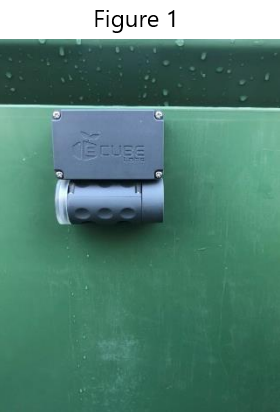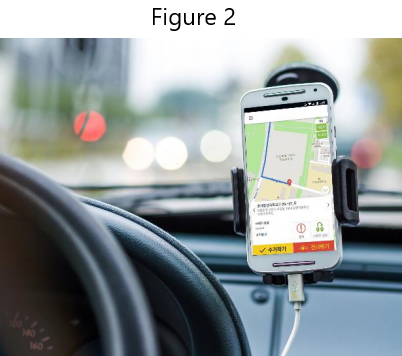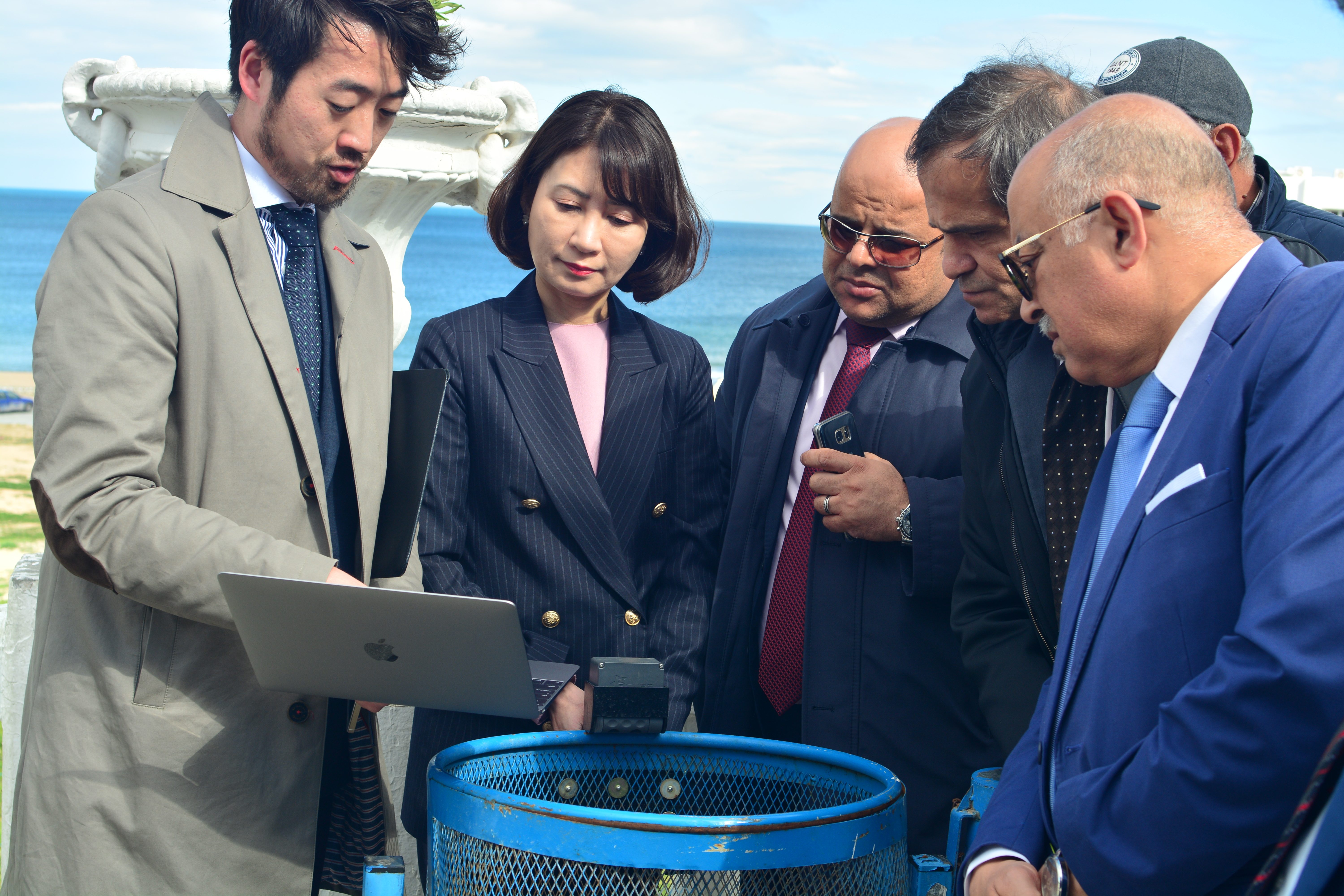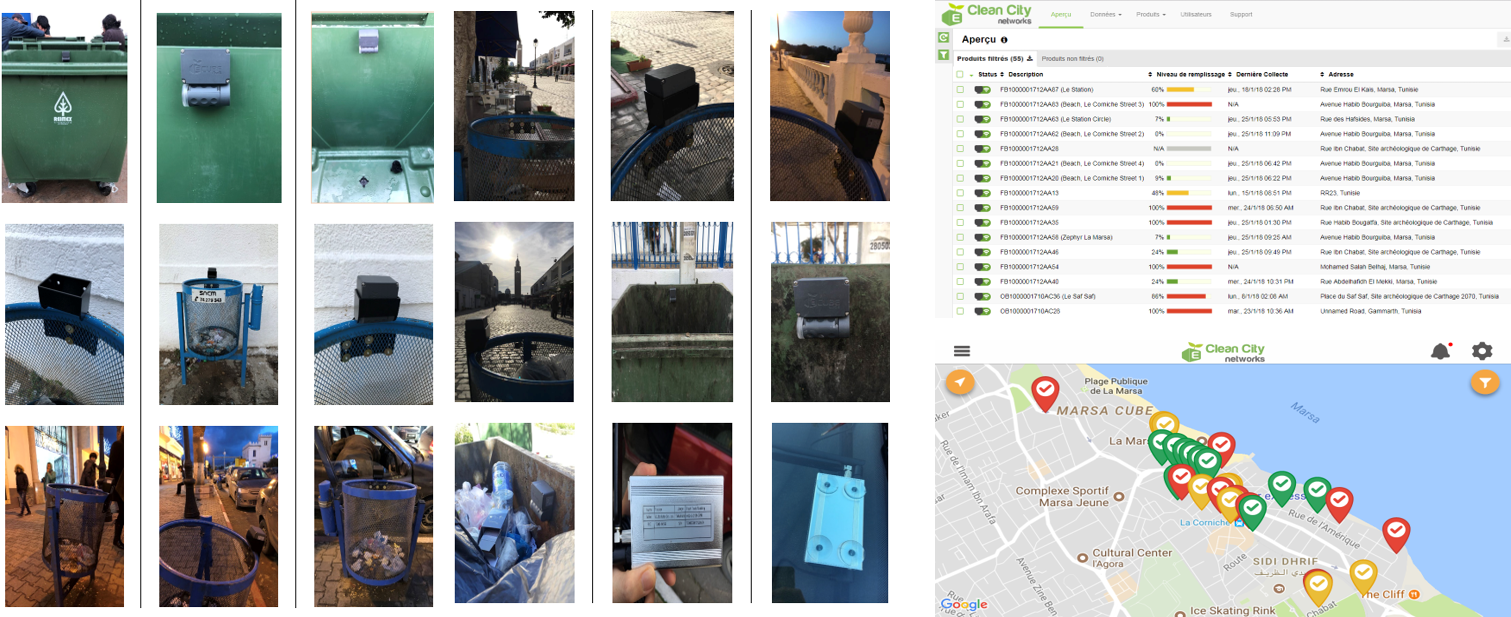
Smart Waste Management
- WEGO |
- Smart Sustainable City Projects Catalog
La Marsa
To establish communication with this city regarding their project, please contact secretariat@we-gov.org
-
Fast Facts
City :
$7,733
Net Annual Savings
100%
WeGO Funding
88%
Waste Overflow Reduced
Region : Africa, Mediterranean
National GDP Per Capita (USD) : 3,573 (IMF, 2018)
City Population: 92,987
Year Implemented : 2017
National Gini Index : 35.8 (World Bank, 2010)+
Tags : ENVIRONMENT WASTE IOT
Technologies Utilized : IoT: CleanCAPs and CleanTrackers
Funding Source : WeGO 2017 Feasibility Study
Project Cost : $12,750 annually ($10,085 additional fixed cost in 2017 alone)
Project Savings : $20,483 annually (beginning in 2018) with a net of $7,733
Planned Project Duration : One year (with potential to extend)
KPIs : Cost savings, overflow frequency, collection optimization
-
Project Context and Overview
La Marsa is a small coastal city in Tunisia with less than 100,000 inhabitants. It is known to be a popular vacation destination due to its beaches and pleasant climate. La Marsa wished to improve its waste collection, both for a more efficient city budget but also for the cleanliness and beauty of the city and consequently, the quality of life for its citizens. City leadership saw IoT and data analytics as an opportunity to revolutionize its waste management. In addition, it closely aligned with the Digital Tunisia 2020 strategy that emphasizes entrepreneurial culture and encourages the development of IoT and data-driven innovation for smart cities.
To better understand the opportunities for smarter waste management, La Marsa applied for the WeGO feasibility study program and was selected by the panel of judges in 2017. WeGO has provided its annual feasibility study to member cities and local governments since 2010. This technical assistance program is designed to help members assess their current smart city development status and draw realistic and concrete smart city & e-Government strategies. Each year, a call for proposals is released to WeGO members and applications are received and evaluated by a panel of experts based upon both the quality of application and the city’s demonstration of commitment to smart city development.
La Marsa received expert consultation and hardware solutions from WeGO’s partner, Ecube Labs. After a consultation process, 55 IoT devices (50 CleanCAPs, 5 CleanTrackers) were installed in order to collect, store, and analyze data to improve efficiency both in terms of fuel as well as human resources. -
Project Planning and Implementation
WeGO and Ecube Labs worked closely with the La Marsa Municipality Smart City Division and created a consultation methodology. The project was launched in October 2017 with the formation of a working group, followed by an on-site inspection which included interviews with officials and environmental research. Modifications to hardware and software were then made, followed by a second on-site visit in which the product was installed for a pilot period as well as further interviews with officials being made. Based upon this initial period, an action plan and budget were established and confirmed. Economical and technical feasibility for the project was conducted. A final report was delivered in addition to an on-site workshop. The pilot period for the system ran until December 31, 2018.
The project consists of three main components: CleanCAP (CCP), CleanTRACK Module (CTM), and CleanCityNetworks (CCN). CleanCAP (See fig. 1). is an ultrasonic sensor which can monitor the fullness of the trash as well as detect fire. The sensor can also detect tipping of the trash can. Its battery life is five years and it can operate over a variety of communication channels including GSM, WMCMA, and Low-Power Wide-Area Network (LPWAN). The hardware for one unit costs about $150 and 50 units were incorporated into the trial. The CleanTRACK Module (CTM) is an on-board vehicle data-gathering module which can help assess important numbers such as tire pressure, fuel consumption, braking patterns, and more as well as GPS tracking. It connects to mobile devices, providing real-time access to the data at any time (See fig. 2). Five units were installed for the trial at a cost of $170 per unit.
Both types of devices feed their data wirelessly to cloud-based storage to be analyzed by Clean City Networks (CCN) software. This software platform is able to help analyze patterns in waste generation and collection frequency as well as track vehicle locations and patterns for creating optimally efficient routes. These solutions aim at reduction of both fuel consumption and wasted labor (See fig. 3). The 2017 budget was $22,835, with one-time hardware costs amounting to $10,085 and the CCN software system which cost $9,000 for a one year subscription. The remaining budget was used for maintenance. Subsequent years of the system, if it is permanently implemented, will cost just $12,750 as the hardware is already in place. -
Project Results
Data is currently being analyzed, as the trial officially concluded on December 31, 2018. However, if cost savings from case studies in cities like Seoul, Dublin, and Ghent are applied to La Marsa, the annual savings are estimated at about $20,483 annually. This breaks down to: $6,181 (fuel), $10,989.35 (labor), and $3,313.08 (maintenance). After subtracting the annual budget of the project, the net annual savings of the project is $7,733. This totals to $59,520 by 2025 if the system is permanently implemented.
While citizen satisfaction and quality of life as a result of the project are not easily quantifiable, the frequency of overflow has been tested to reduce by 88% and frequency of collection is reduced by 83%. These reductions in collections have quality of life benefits beyond the obvious reduction in clutter, such as less traffic from unsightly waste collection vehicles. -
Recommendations for Transfer
As part of the consultation process, Ecube Labs benchmarked five case studies of smart waste management projects elsewhere. These cases demonstrated that such projects are adaptable depending on the contextual needs of the case and may vary in their complexity of technology and scale. All cases employed container fill level sensors for more effective management of collection schedules. In Seoul and Melbourne, containers had solar powered compactors installed in order to control overflow with fewer collections. In Dublin’s airport solar power cannot be deployed indoors, collections are therefore made on foot rather than in vehicles.
These cases demonstrated various applications of smart waste tech, and it was important for La Marsa Municipal Smart City Division, upon consultation, to determine which aspects might best transfer to their context. In La Marsa’s case, the distance between collection points meant that CleanTRACK on-board-units made practical sense in order to reduce fuel costs for vehicles, but in a more dense geographic area such as a university campus, this may not make practical sense. It is recommended that city officials both have an accurate and objective appraisal of their city’s needs in order to best choose a system that works for them and also to consider how such a program fits into their holistic smart city vision. -
Figures and Images




-
External links



